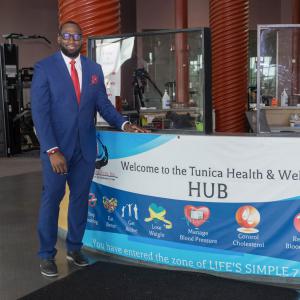Eat Better, Feel Better
Extension nutrition program coaches meal planning, exercise
Story by Nathan Gregory • Photos by Kevin Hudson
You don’t have to have diabetes to benefit from the principles of the Dining with Diabetes (DWD) program.
Just ask William Walton, who weighed in at 280 pounds when he started the nutritional diabetes education program. Although it was spread evenly over his 6-foot, 5-inch frame, Walton was still concerned about his weight— he wanted to rein in his cravings and reclaim some of his energy.
“My current weight is 270, and I have been maintaining,” Walton says. “When I initially started the program, my weight had gotten as low as 265 pounds with practices from the DWD program. I have been pleased with my results, and I love being able to work out longer in the gym.”
Walton, director of the parks and recreation department in Tunica County, learned about the program from former Mississippi State University Extension Service agent Ira Martin, who was also based there. Martin had recently created educational videos with MSU Extension nutritionist Qula Madkin for National Men’s Health Month.
“I am not a diabetic, but I love Dr. Peppers,” Walton admits. “I can’t remember the exact month, but I walked in on a demonstration Ira was doing for this program and decided to try it myself. I have not formally finished all four steps, but I have incorporated healthy eating into my diet and practice the different cooking techniques.”
“We would host networking meetings to identify how best to serve the needs of Tunica County,” Martin adds. “I presented the DWD program, and he was interested in participating. He eventually told me he became more active, lost weight, lowered his blood pressure, and learned what foods were healthy and how to prepare them. He also said he’s more conscious of the foods he eats and that he looks and feels better.”
The four DWD workshop lesson topics include living well with diabetes; carbohydrates and sweeteners; fats and sodium; and vitamins, minerals, and fiber. An optional fifth follow-up workshop is also available. The program is for anyone who is at least 18 years old.
“With this program, we want to equip people with strategies they can use to manage their diabetes through menu planning, nutrition education, portion control, and label reading,” Madkin explains. “The target audience is not just people with diabetes but also those who have concerns about diabetes or have family members or friends who are at risk.”
Participants increase their knowledge of healthy foods and, specifically, which foods turn to sugar. They also learn how to cook healthy versions of favorite foods.
“My go-to meal is lightly seasoned medium salmon and broccoli cooked in an air fryer,” Walton says. “I started meatless Wednesdays, and I feel great the days after not eating meat.
“Since starting the DWD program, I sleep better at night, and I don’t get sleepy after I eat,” he adds. “I have more energy at the gym, and I have been working out for at least 2 hours. Before starting the program, my workouts would last only 30 minutes.”
Walton knows Tunica Countians who have benefited from Martin’s demonstrations.
“We get pretty good feedback from seniors within the community who are living with diabetes,” he says. “Ira partnered with our health and wellness manager, who facilitates fitness classes, conducts monthly meetings about living with diabetes, and has built in dieting options for participants. Those same people are also in our daily chair aerobics in addition to working out at our health and wellness pavilion.”






